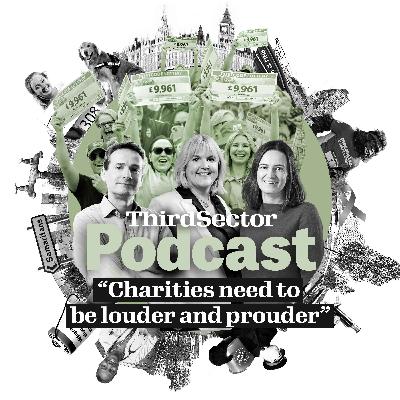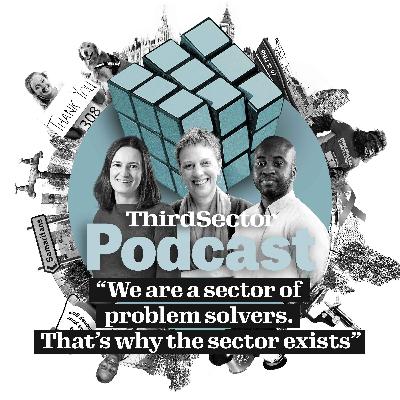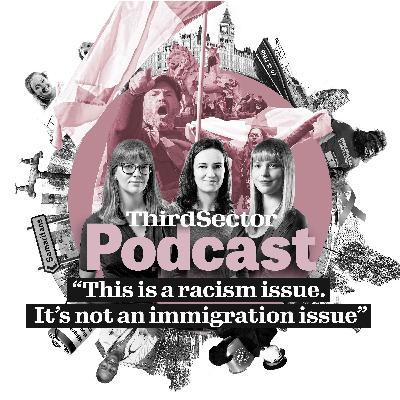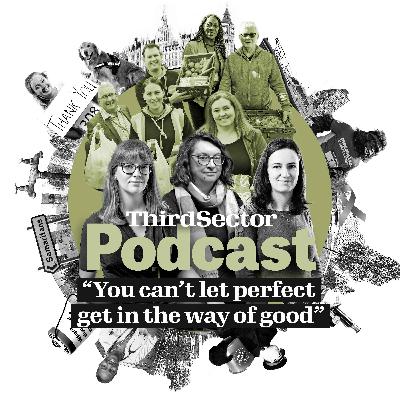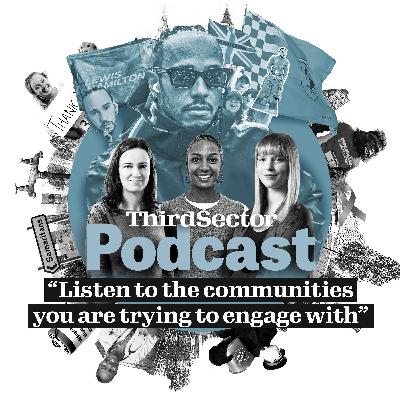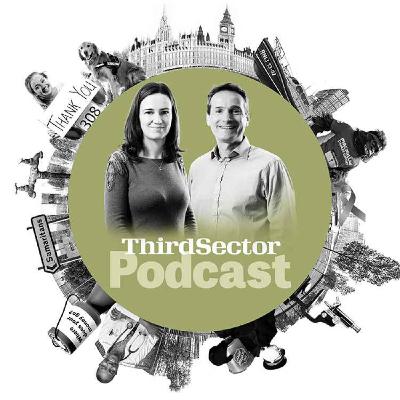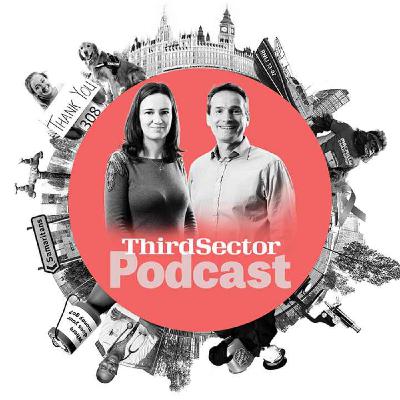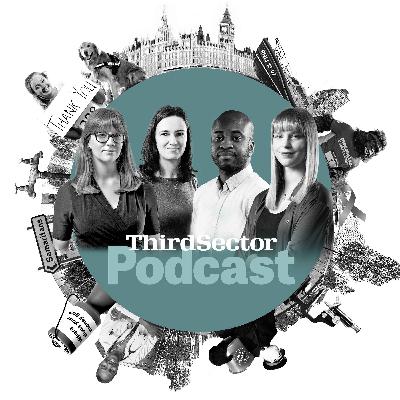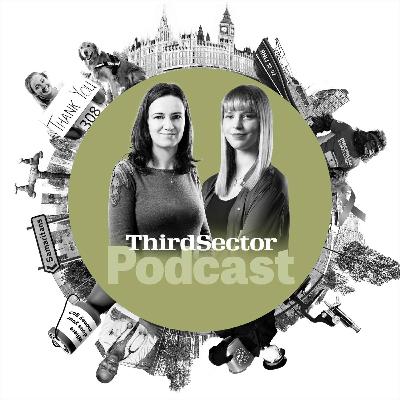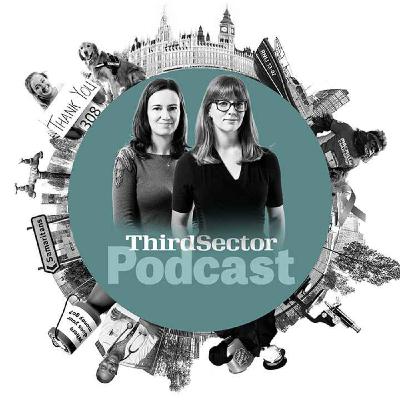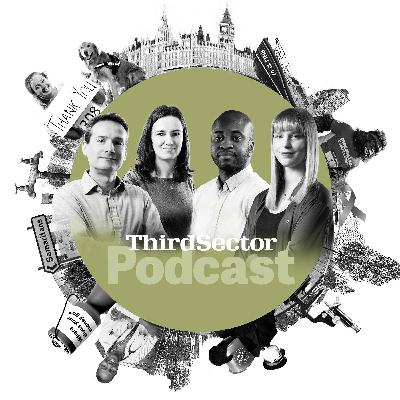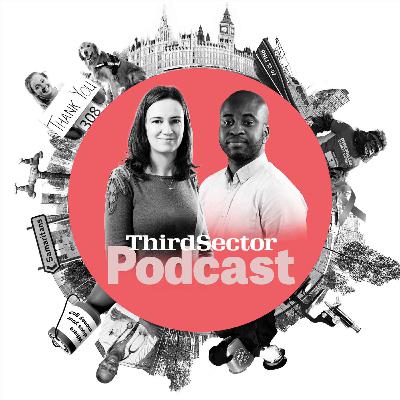Discover Third Sector Podcast
Third Sector Podcast

Third Sector Podcast
Author: Third Sector
Subscribed: 202Played: 7,900Subscribe
Share
© All rights reserved
Description
A weekly podcast from Third Sector, the UK’s leading publication for everyone who needs to know what’s going on in the voluntary and not-for-profit sector.
Hosted on Acast. See acast.com/privacy for more information.
289 Episodes
Reverse
Lucinda Rouse and Emily Harle are joined by Chloe Hadjimatheou, narrative editor at the Observer, who conducted an award-winning exposé of the main characters in the bestselling memoir The Salt Path.Chloe details the steps she took to interrogate some of the assertions made in the book after receiving a tip-off, including the circumstances of an apparent terminal diagnosis.She suggests ways in which charity leaders can work to uncover the truth when claims surrounding prospective celebrity ambassadors seem out of the ordinary, but stresses the importance of approaching the people in question in the first instance. Tell us what you think of the Third Sector Podcast! Please take five minutes to let us know how we can bring you the most relevant, useful content. To fill in the survey, click here.
Hosted on Acast. See acast.com/privacy for more information.
Emily Harle and Emily Burt discuss snippets from a recent interview with Hannah Bond and Taahra Ghazi, the new co-chief executives of ActionAid UK.Hannah speaks of the value of a co-chief executive model in supporting feminist leadership and ensuring the best possible decisions are made for an organisation.Taahra acknowledges the loneliness encountered by many single chief executives and describes the co-chief model as a way of preventing burnout.She also talks about the charity’s anti-racism work, which has included the formation of a dedicated decolonisation unit.Tell us what you think of the Third Sector Podcast! Please take five minutes to let us know how we can bring you the most relevant, useful content. To fill in the survey, click here.
Hosted on Acast. See acast.com/privacy for more information.
Emily Burt and Emily Harle are joined by Zia Salik, interim director of Islamic Relief UK, to talk about the rising levels of Islamophobia and racism targeting the charity.Zia describes the measures being taken to support staff in the face of growing online and face-to-face hostility, and the need to plan for an increased risk of attacks during the month of Ramadan.He stresses the need for organisations and people in positions of power to take a public stand against racism and Islamophobia, as well as the value of solidarity and allyship from others in the sector. Tell us what you think of the Third Sector Podcast! Please take five minutes to let us know how we can bring you the most relevant, useful content. To fill in the survey, click here.
Hosted on Acast. See acast.com/privacy for more information.
Emily Harle and Dami Adewale are joined by Madeleine Jennings, head of policy and communications at the Local Trust.Madeleine describes how her team has worked to translate lessons learned from the Local Trust’s ‘Big Local’ programme into actionable government policy. She stresses the importance of forming relationships with civil servants as well as big-name elected representatives, and explains why it is necessary to identify and provide information that is useful to officials.She also describes the logistical steps to securing and facilitating a project visit by a senior government representative. Tell us what you think of the Third Sector Podcast! Please take five minutes to let us know how we can bring you the most relevant, useful content. To fill in the survey, click here.
Hosted on Acast. See acast.com/privacy for more information.
Lucinda Rouse and Emily Burt are joined by Kate Lee, chief executive of the National Council for Voluntary Organisations, to discuss some of the issues facing the voluntary sector in 2026.These include ensuring financial sustainability and the role of civil society in a world of uncertainty in the face of some big existential questions.Kate also shares her reasons to be optimistic, including the next generation of sector leaders coming up and a growing trend of interrogating impact data to improve organisational efficiency.Register for the free Pounds & Purpose summit here.Tell us what you think of the Third Sector Podcast! Please take five minutes to let us know how we can bring you the most relevant, useful content. To fill in the survey, click here.
Hosted on Acast. See acast.com/privacy for more information.
Lucinda Rouse and Emily Harle discuss snippets from a recent interview Emily conducted with Matt Stringer, chief executive of the Royal National Institute of Blind People.Matt provides insight into the RNIB’s transformation programme, which concluded in April, and shares his lessons learned from a significant restructure.He reflects on the differences between charity leadership and his previous work in corporate retail and gives his reasons for leaving the organisation this month.Tell us what you think of the Third Sector Podcast! Please take five minutes to let us know how we can bring you the most relevant, useful content. To fill in the survey, click here.
Hosted on Acast. See acast.com/privacy for more information.
Lucinda Rouse is joined by Emily Burt, Emily Harle and Andy Ricketts to dissect the leading stories from the voluntary sector in 2025.Lucinda delivers a speedy round-up of the year’s charity news before the four discuss their selected top stories. These include the launch of the Civil Society Covenant and leadership and governance challenges at Oxfam GB and World Vision UK.They share their nominations for the year’s strangest stories, from sabotaged locks at a Cheshire museum to the children’s charity whose future was threatened after it bought land that was open to shooting parties.The team reflects on some recurring trends over the course of the year, from the unwelcome waves of redundancies and charity closures to the effects of rising far-right activism on the sector.Tell us what you think of the Third Sector Podcast! Please take five minutes to let us know how we can bring you the most relevant, useful content. To fill in the survey, click here.
Hosted on Acast. See acast.com/privacy for more information.
Lucinda Rouse and Andy Ricketts are joined by Clara Govier, managing director of the People’s Postcode Lottery.Clara outlines the process for disbursing funds to charities and explains what the People’s Postcode Lottery looks for in prospective charity partners. She gives her thoughts on how funders could work together more effectively and puts forward the case for lifting the sales cap on charity lotteries.Tell us what you think of the Third Sector Podcast! Please take five minutes to let us know how we can bring you the most relevant, useful content. To fill in the survey, click here.
Hosted on Acast. See acast.com/privacy for more information.
Lucinda Rouse and Dami Adewale are joined by Jane Ide, chief executive of the charity leaders body Acevo, to reflect on some of the issues facing sector leaders.Jane provides an update on work relating to the Civil Society Covenant, which was published in July, saying more momentum is expected from the government in the first quarter of 2026.She warns that charity leaders should be lowering their expected time in post due to unsustainable pressures. And she observes that polarisation within organisations needs to be considered as much as the work being done externally to convene and strengthen civil society. Tell us what you think of the Third Sector Podcast! Please take five minutes to let us know how we can bring you the most relevant, useful content. To fill in the survey, click here.
Hosted on Acast. See acast.com/privacy for more information.
Lucinda Rouse, Emily Harle and Emily Burt reflect on two significant sector issues from the past month.Emily Harle shares findings from a recent roundtable meeting of leaders from refugee and migration charities, whose staff have experienced a surge in targeted hostility in recent months.And after the government launched its new Office for the Impact Economy, Lucinda asks what the phrase actually means and the part the voluntary sector will play in it. Tell us what you think of the Third Sector Podcast! Please take five minutes to let us know how we can bring you the most relevant, useful content. To fill in the survey, click here.
Hosted on Acast. See acast.com/privacy for more information.
Lucinda Rouse and Emily Burt are joined by Vic Harper, chief executive of the food redistribution charity The Bread and Butter Thing.Vic describes how the charity has taken a holistic approach to the way it supports communities by working alongside other charities and local authorities at its food distribution hubs. She outlines the process of identifying suitable community partners and explains why a one-size-fits-all approach to communication with such a diverse assortment of stakeholders will never work.Tell us what you think of the Third Sector Podcast! Please take five minutes to let us know how we can bring you the most relevant, useful content. To fill in the survey, click here.
Hosted on Acast. See acast.com/privacy for more information.
Lucinda Rouse and Emily Harle are joined by Leicia Feare, associate director of communications and campaigns at the youth empowerment charity Mission 44.Leicia talks about the charity’s first campaign, Nothing Happens in Isolation, which aims to promote inclusion in schools. She describes how Mission 44 convened partners to formulate a list of recommendations that the charity’s founder, the motor racing driver Sir Lewis Hamilton, presented to the Prime Minister.She outlines the measures taken by the charity to incorporate the views and priorities of young people who have experienced exclusion from school and explains how it has avoided tokenism in the process.She reflects on the value of having a popular figurehead at the top of the organisation while acknowledging the difficulty of developing a stand-alone profile for Mission 44 when media interest is invariably focused on its central personality.Tell us what you think of the Third Sector Podcast! Please take five minutes to let us know how we can bring you the most relevant, useful content. To fill in the survey, click here.Subscribe to the Third Sector Podcast on Apple Podcasts or on Spotify.
Hosted on Acast. See acast.com/privacy for more information.
Lucinda Rouse and Andy Ricketts are joined by Ruth Hollis, chief executive of the Olympic legacy charity Spirit of 2012.Ruth reflects on the responsibility of being a funder approaching close-out as Spirit of 2012 prepares to wind up in early 2026.She acknowledges the difficulties for charities seeking to ensure the sustainability of their programmes in the absence of long-term funding and suggests ways in which grantmakers can work together to reduce the occurrence of funding cliff-edges.She stresses the importance of built-in time for reflection during the course of a programme and explains how Spirit of 2012 is taking a different approach to its final report.Tell us what you think of the Third Sector Podcast! Please take five minutes to let us know how we can bring you the most relevant, useful content. To fill in the survey, click here.
Hosted on Acast. See acast.com/privacy for more information.
Lucinda Rouse and Andy Ricketts share their thoughts on the announcement this week that Dame Julia Unwin has been named the preferred candidate to be the new chair of the Charity Commission.Andy explains the role of the chair, suggests how Unwin might be different to her predecessors and provides a summary of reactions from sector leaders to the prospect of her appointment.An excellent choice’ – sector leaders react to Charity Commission chair announcement.Tell us what you think of the Third Sector Podcast! Please take five minutes to let us know how we can bring you the most relevant, useful content. To fill in the survey, click here.
Hosted on Acast. See acast.com/privacy for more information.
Lucinda Rouse, Emily Harle, Emily Burt and Dami Adewale reflect on some of the top sector stories from the past month.Emily Burt gives her thoughts on the state of the sector in 2025 following her recent return from maternity leave.Lucinda shares snippets from an interview with Peter Sparkes, chief executive of the Royal National Lifeboat Institution, in which they discuss a new five-year plan that aims to improve engagement with the charity’s fundraising and volunteering communities.Dami explores conflicting narratives on the health of volunteering more broadly and the key motivators for people signing up to volunteer roles.And Emily Harle reflects on what the recent closure of Manchester Pride says about how charities communicate financial difficulty.Listen back to Janet Thorne on the Third Sector Podcast: Cultivating a more flexible volunteering offer.Tell us what you think of the Third Sector Podcast! Please take five minutes to let us know how we can bring you the most relevant, useful content. To fill in the survey, click here.
Hosted on Acast. See acast.com/privacy for more information.
Lucinda Rouse and Emily Harle discuss snippets from a recent interview Emily conducted with Andy Fletcher, chief executive of Muscular Dystrophy UK.As Andy enters his second year in post, they reflect on his ambitions to almost double the charity’s income by 2035, raise awareness for the organisation among people living with muscle-wasting and weakening conditions and cultivate a sharper strategic focus.Tell us what you think of the Third Sector Podcast! Please take five minutes to let us know how we can bring you the most relevant, useful content. To fill in the survey, click here.
Hosted on Acast. See acast.com/privacy for more information.
Lucinda Rouse and Andy Ricketts are joined by Laura Kerby, chief executive of Prostate Cancer UK. Laura outlines the due diligence conducted by the charity to try to alleviate concerns about its partnership with the gambling company Paddy Power, which has allowed it to deliver live-saving interventions to men at risk of prostate cancer.She describes the complexities of engaging with political parties such as Reform UK, whose policies are often at odds with the charity’s priorities but who nonetheless need to be factored into its influencing work.She explains how Prostate Cancer UK is working to keep prostate cancer in the spotlight, through bold and ambitious programming, working with celebrity ambassadors and clearly demonstrating its impact.Tell us what you think of the Third Sector Podcast! Please take five minutes to let us know how we can bring you the most relevant, useful content. To fill in the survey, click here.
Hosted on Acast. See acast.com/privacy for more information.
Lucinda Rouse and Emily Burt are joined by the civil society consultant Alex Evans to talk about the role of freelancers in the charity workforce.They discuss the findings of a survey by the freelancer platform Blume, from the pros of flexibility and autonomy reported by self-employed workers, to feelings of uncertainty and the fact that more than a fifth of respondents began freelancing as a result of redundancy.Alex shares his perspective on the push and pull factors that lead charity professionals to leave full-time employment, including his view that some people are forced to take on uncertainty because of structural inequalities, including the gender pay gap. They also hear from Georgie Moseley, chief executive of the cancer charity Help Harry Help Others, about why her organisation has opted to contract a majority of its workers on a freelance basis.Read Alex’s blog, Barely Civil Society.Tell us what you think of the Third Sector Podcast! Please take five minutes to let us know how we can bring you the most relevant, useful content. To fill in the survey, click here.
Hosted on Acast. See acast.com/privacy for more information.
Lucinda Rouse, Andy Ricketts, Emily Harle and Dami Adewale reflect on some recent voluntary sector news.Emily shares snippets from an interview with Breast Cancer Now’s chief executive Claire Rowney, in which she articulates her vision to shift the organisation from a medium to a large charity mindset, accompanied by a £40m annual revenue uplift.Dami asks what the move by several charities to distance themselves from the Duchess of York in the light of Jeffrey Epstein-related revelations says about royal patronages.And Lucinda talks about some of the different ways that charities are approaching enterprise in a bid to diversify their income streams and utilise their assets in new ways.Tell us what you think of the Third Sector Podcast! Please take five minutes to let us know how we can bring you the most relevant, useful content. To fill in the survey, click here.
Hosted on Acast. See acast.com/privacy for more information.
Lucinda Rouse and Dami Adewale are joined by Helen McShane, director of research, innovation and systems change at Young Lives vs Cancer.Helen explains how Young Lives vs Cancer came to launch an innovation lab, with the aim of using its assets as a trusted charity brand to support the development of early stage business ventures that align with its mission of supporting children and young people with cancer.She describes the challenges associated with carving out time and space to work on long-term innovative solutions as a charity supporting the immediate and urgent needs of people in crisis.Tell us what you think of the Third Sector Podcast! Please take five minutes to let us know how we can bring you the most relevant, useful content. To fill in the survey, click here.
Hosted on Acast. See acast.com/privacy for more information.









